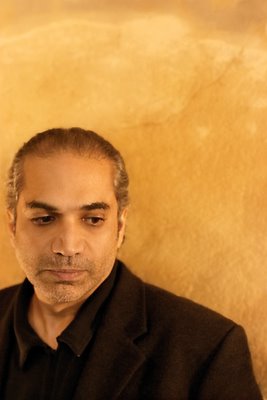Thursday, December 29, 2005
?هل البومة طائر جميل


توخيت في محاولتي اقتناء هذه الصور أن تكون كل طيور "البوم" متسمة بصفة "الجمال"! هل البومة طائر "جميل" – فعلاً؟ لا أقصد من هذا السؤال الوصول إلى إجابة بنعم أو بلا، بل أود أن أضع يدي على الخيوط التي أريد لها أن تقودني إلى تحديد العلاقة – الملتبسة دائماً – بين الجمال والثقافة، أي لماذا لا نرى "الجمال" في طائر مثل البومة؟ لماذا "يكره" – إن جاز لنا التعبير – من نشأوا في ظل ثقافة عربية (مصرية تحديداً) البومة باعتبارها كائناً "قبيحاً" (لدينا الكثير من الأمثال والتعبيرات الاصطلاحية التي تؤيد ذلك) ونذيراً للشؤم؟ السؤال هو هل هناك علاقة بين الحب والكراهية أي أننا نميل إلى "كراهية" ما نراه قبيحاً أو بمعنى آخر نميل إلى أن نرى قبيحاً كل ما نكره؟!
Tuesday, December 20, 2005
Makan: the story of a “place”

Officially speaking, the Egyptian Centre for Culture & Arts (ECCA) was started in 2002, is located near the Giza pyramids on the road leading to al-Fayum, the first of a string of oases leading into the White Desert. ECCA was a musical salon concerned with the retention of Egyptian traditional music in its ‘raw’ forms, as Dr. Ahmed El-Maghraby, the project manager of ‘ECCA’, said, known now as just ‘Makan’, which denotes ‘place’.
Quite uneasy concerning the constant ‘commodification’ of the traditional Egyptian music, Dr. Ahmed El-Maghraby, who is offput by the tourist-likes-it-so approach, has been resolved to launch a “Makan” where the more professional researchers and experts can meet with an interested audience aiming at the maintenance of the oral Egyptian musical legacy.
In November 2004, ECCA turned to be ‘Makan’, which took the ‘place’ of the old ‘Balagh’ Press owned by Abdel-Qader Hamza Pasha (died 1947). Makan is a pretty self-funded venture, with about L.E. 200,000 afforded to turn the 150-metre square old press into a folkloric café-like auditorium, performance hall and even offices for the project manager and his assistants!
Now located in the well-populated suburb of Sayyeda Zainab, Makan aims to document folkloric musical tradition of the various regions of Egypt, whether of Nubia, Upper Egypt, Lower Egypt or even that of the Bedouin tribes. To make such mission come true, Makan teamwork offer workshops, seminars and exhibitions as well as disseminate CDs and video documentaries to promote creative dialogues among people and cultures, with a special emphasis on the ‘African’ constituent of the Egyptian culture.
The second element of the Makan’s vision is to perform such maintained traditional music in a more or less ‘essential’ or original form. Such authenticity of performance is even intensified by the snugly atmosphere of the Makan, as the audience ‘feel at home’, to quote Dr. El-Maghraby. “The Egyptians were blessed by a time where music was an everyday experience. Every Egyptian used to listen to a melodious adan (“call for prayer”), Coptic hymns in churches, genuine music during weddings as well as in zikr sessions”, said El-Maghraby. The Makan’s ‘cultural engineer’, as he himself names it, believes that a contemporary audience deserves to listen to and enjoy such intact musical reservoir as did their predecessors.
However, the archetypal samples of the Egyptian musical legacy that could be safeguarded cannot be presented – alone – with no attempt for renewal and innovation. Makan believes that channels of communication between older and younger generations of musicians should be initiated and encouraged, as well as urging the mutual workshops between Egyptian traditional music practitioners and European ensembles and bands. “[Makan] acts as a meeting point between East and West”, said Alexander Zeldin, director in Etha Theatre Company (Oxford, the UK), which performed in Egypt a theatrical performance titled “Calderón de l’a Barca’s” (The Constant Prince) inspired by the vibrant music of the Zar by the Mazaher’ ensemble.
Makan’s ambitious projects cover three areas of the Egyptian musical tradition: Nubia, the Zar and that of the once famous but nearly forgotten Egyptian singer Naima al-Masriya, who performed in the region at the turn of the last century. The first two projects have exclusively received funds from a Swedish donor organisation. Further, Makan’s administration was keen to arrange for festivals abroad. “Our target is to make culture an artistic product, but a value-added and un-fossilised one”, said Mr. El-Maghraby. Makan participated in a music festival (“Les Allumées”) held in Nantes, France in 1994. It was a 6-night festival featuring Egyptian music with the contribution of seven Egyptian musical ensembles. Another festival was Marseilles Opera for the Mozart L’Egyptien. It is expected that the Mazaher Zar music ensemble will contribute in the ‘Woman Voice’ Festival to be held in November 2005. Other future projects are a workshop and CD production with the Italian ensemble Novalia, as well as a workshop and CD with the French-Cuban ensemble Ocho Y Media.
Another aspect of Makan’s work is directed towards musical instruments, which accompany the art of the Zar in particular. These include the tanboura (a kind of pharaonic lyre), al-noggarra (a large drum), and percussion instruments in general. Other instruments are al-mishar and al-hana (forms of hoop), al-dahla, and small African drums (called hajir in Arabic), and al-Manjour (a leather belt with many horns and goat nails connected to it).
As for CD production, Makan produced the Mozart Egyptien, Virgin Classics Ltd, which won the French ‘Diapason D’or’ Award. This CD, which is an Egyptian musical manipulation of Mozart’s music, sold some 300,000 CDs. Other CDs produced by Makan include Ensemble David, Coptic liturgies. Institut Du Monde Arabe, Paris, France; La Chadhiliyya. Sufi chants from Cairo. Institut Du Monde Arabe; Ganoub. Musique et Chant de la Haute Egypte. Produced by Naïve, France; Belphegor. Le Fantome Du Louvre, produced by Warner Music France; and Novalia. Canti & Briganti, CNI, Italy.
Concerts are performed all over the year. An average of 8 concerts take place every month, in addition to the workshops, rehearsals, seminars and other relevant events. When you visit Makan, expect to attend and enjoy a concert by genuine musicians from Nubia (such as Sayed Gayer, founder of ‘Aragid’ ensemble), the Mazaher (Zar ritual music), and mawawil (Baladi musical group).
Makan
1 Saad Zaghloul Street, the right side of Darih Saad Zaghloul,
11461, El Dawaween , Cairo.
Tel: 7920878
Monday, December 12, 2005
التعليم الدولي وتدريس الأدب العربي مترجماً
يقيم مكتب البرامج الدولية بالأكاديمية الحديثة بالمعادي ندوة بعنوان "التعليم الدولي وتدريس الأدب العربي مترجماً"
ويتحدث في هذه الندوة:
ويتحدث في هذه الندوة:
سحر توفيق، روائية وقصاصة ومترجمة مصرية
إبتهال سالم، روائية وقصاصة ومترجمة مصرية
ماريلين بوث، باحثة ومترجمة أمريكية
يقدم الندوة الدكتورة كريمة الأنصاري وعلاء الدين محمود
المكان: الأكاديمية الحديثة بالمعادي، ش 304 المعادي الجديدة، قاعة محاضرات رقم (5).
التاريخ: الأربعاء 14 ديسمبر 2005 - الساعة 6-8 مساء
اللغة: العربية، الإنجليزية.
تناقش هذه الندوة ظاهرة التعليم الدولي في مصر وأهمية تدريس الأدب العربي مترجماً إلى اللغات الأجنبية (خاصة الإنجليزية) واستقبال هذا الأدب في الغرب، ويتخلل ذلك قراءة علنية لقصص لكلا من الكاتبتين المصريتين وأسئلة تفاعلية بين ضيوف الندوة والجمهور والطلاب.
